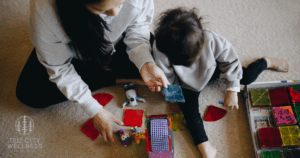You and your partner seem to be stuck in a cycle of a seemingly repeated argument. Maybe last week it was the dishes and this week its the kids sports, but the feelings are still the same — Why doesn’t he ever listen to me? Why does she tell me I never do anything right?
In reality, it may actually sound something like this:
- “We don’t see eye to eye on anything anymore. We have totally different styles of communicating.”
- “I don’t ever feel heard or listened to. It’s like anything I say goes over your head and isn’t important to you.”
- “I literally can never bring anything up to you because you just shut down and we never get anywhere.”
If this sounds familiar, you’re not alone—and it’s not just about learning how to communicate better. What’s really happening is that there’s a deeper emotional need that neither of you is fully recognizing. Let me explain….
In my practice, I help couples break out of these painful patterns using interventions stemming from Attachment Theory and Emotionally Focused Therapy (EFT). And here’s the thing: while communication is important, the real issue goes beyond words. It’s about the underlying emotional dance you’re caught in—the one that keeps both of you feeling frustrated and disconnected night after night after night.
Why Communication Feels Impossible
At first glance, it seems like you and your partner just can’t communicate. One of you might be trying to explain something, while the other shuts down or gets defensive. At the heart of every conversation, it’s not really about communication differences. It’s about emotional safety. We are all internally surveying our situation and asking ourselves, “Do I feel safe enough to share this? Do I feel worthy of my needs being heard and held and respected? Do I believe that I will still be unconditionally loved, even if I share this information?
Let’s say one partner says, “You never listen to me!” and the other replies, “You’re always upset with me no matter what I do!” What’s really happening here? The first partner is probably feeling invisible, like their thoughts and feelings don’t matter. The second partner, on the other hand, is feeling overwhelmed, afraid that they’re failing in the relationship no matter how hard they try. One person is exploding and the other person is imploding.
This isn’t just a fight about listening—it’s about feeling valued, loved, and secure. When you’re both focused on protecting yourselves from hurt, defense mechanisms go up and real communication gets lost in the process.
Breaking the Cycle That Keeps You Stuck
What you’re experiencing isn’t just a bad habit, it’s a pattern. One partner pursues and pushes for more connection, while the other withdraws or shuts down to avoid the conflict. This is often called a pursuer-distancer cycle and the cycle feeds upon itself, with both of you feeling more and more disconnected in the end because you are each triggering each others deepest attachment fears (feeling rejected, feeling alone, feeling unloved).
Here’s what that might look like in your relationship:
- One of you feels abandoned or unheard, so you get frustrated or critical.
- The other feels overwhelmed or attacked, so they shut down or pull away.
Sound familiar? Neither of you are the “cause” of the problem — The cycle is the problem. The first step to fixing a dynamic like this is to try to detach yourselves from the idea of either winning an argument or being right. You need to look at the cycle as the enemy, then join with your partner in trying to attack the cycle rather than attacking each other.
What You’re Really Looking For
Underneath all the arguments, there’s usually a deep emotional need you’re both trying to express—but in ways that push your partner away. The real need is often to feel:
- Loved unconditionally
- Accepted for who you are
- Emotionally safe and supported
Naturally, most of us don’t know how to express these needs clearly because we aren’t taught these skills in childhood, so we get stuck in patterns that protect us from emotional pain. Maybe you criticize your partner because you feel unseen, or maybe you shut down because you’re afraid of being judged. Either way, the real need remains unmet.
Arguing is another way for partners in a relationship to connect. You know the child who thinks that any attention is good attention, even if it’s doing something they know they aren’t supposed to? Well, conflict as adults in relationships is the same thing.
When you pick a fight with your partner, you’re trying to see if they care enough to fight back. But what you really want is to fight for the relationship, which you both typically have a goal of saving even if it doesn’t seem like that on the surface.
How Your Attachment Style Plays a Role
You might also be carrying old emotional patterns from your past that affect how you connect with your partner today. This is where attachment theory comes in. The way you learned to connect with caregivers as a child often shapes how you approach intimacy and conflict as an adult.
In very basic definitions:
- Anxiously attached individuals often fear abandonment and seek more reassurance.
- Avoidantly attached individuals tend to withdraw and avoid emotional intimacy to protect themselves.
- Disorganized attachment (sometimes called fearful-avoidant) individuals tend to have a push-and-pull dynamic where they may exhibit behaviors that push their partner away when they really crave more attention and connection.
How to Start Communicating in a Way That Actually Works
So, how do you move forward? Here are a few key steps to help you start breaking the cycle and reconnecting on a deeper level.
1. Name the cycle, not each other
Instead of pointing fingers, focus on naming the negative pattern. For example, instead of saying, “You always shut down when I try to talk,” try saying, “It feels like we get stuck in a pattern where I get frustrated, and you withdraw.” By naming the cycle, you make it the common enemy instead of turning on each other.
2. Create emotional safety
Real communication happens when both of you feel emotionally safe. This means listening without judgment, being open to hearing each other’s vulnerabilities, and responding with empathy. The goal isn’t to be right—it’s to understand each other’s emotional experience. To start, whenever you have a difficult topic to bring up, schedule it in advance. Give each person warning and make sure you are each in a mental space to have a tough conversation. Also make sure that you are well slept, well fed, and able to actively listen and participate in the conversation.
3. Identify and share your deeper needs
When you’re feeling angry or frustrated, pause and ask yourself what you’re really feeling underneath. Are you afraid of being abandoned? Do you feel like you don’t matter? Share that with your partner in a way that invites connection: “I think I’m feeling scared that I’m not important to you right now.” I know it’s scary to be so vulnerable, but taking these kinds of actions will dramatically help the way the conversation progresses.
4. Allow vulnerability
Vulnerability is the key to emotional intimacy. It’s about being brave enough to share your true feelings, even when it feels risky. When you show your vulnerable side, you open the door for your partner to do the same—and that’s when real healing begins.
5. Practice patience
Breaking old patterns takes time, and there will be moments where you fall back into the cycle. Even if you feel like you’ve tried a million things in the past, there’s a shift that happens when both partners commit to recognizing and working on the negative cycle. You have to try to give your partner the benefit of the doubt and trust the process (hint: This is where having a therapist to hold you each accountable can be super helpful!).
The Path to Reconnection
If you’re reading this and thinking, “This is SO us,” know that you’re not alone— We work with couples in our office every day who are stuck in a similar cycle and we also see these couples make meaningful changes all of the time. You definitely are not doomed to stay stuck in this cycle. Just remember — What feels like a communication problem is really a call for deeper emotional connection. And with the right tools and understanding, you and your partner can rewrite your story.
You deserve to feel loved, understood, and emotionally safe in your relationship. If you’re ready to start breaking the cycle and rebuilding that connection, reach out to work with one of our counselors at Tree City Wellness. We’re here to help you and your partner reconnect in ways that lead to lasting love and trust.





